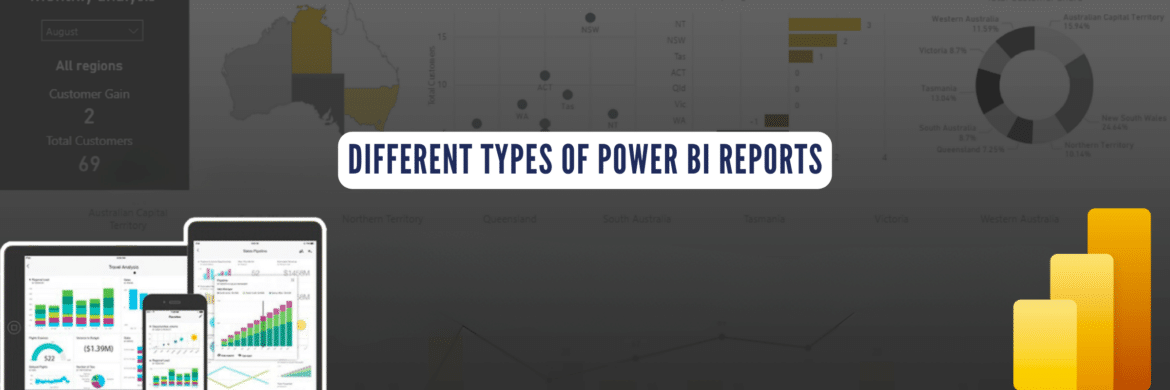
Ecommerce Business Intelligence: Why Do You Need It?
Tarsem Singh | June 22, 2024 , 15 min read
Table Of Content
In a world where every click counts, where a pixel’s placement can be the difference between triumph and tumble, the realm of e-commerce stands as a thriving battleground. A battleground where giants like Amazon, Alibaba, and Walmart wage fierce wars of algorithms, convenience, and user experience.
But here’s the jaw-dropping revelation: they are not alone in this race.
In the colossal landscape of e-commerce, the data says that by 2026, the e-commerce market is expected to total over $8.1 trillion. Amazon, one of the e-commerce behemoths, captures roughly 49% of the U.S. e-commerce market. That’s nearly half of all online sales in the country.
This digital arena is not merely about selling products; it’s about orchestrating a symphony of data-driven intelligence. Imagine if you could unlock the secrets to boosting your conversion rate or the sorcery of doubling your average order value.
So, let’s embark on a journey into the world of e-commerce business intelligence, where data is your secret weapon for success.
Annual net sales revenue of Amazon from 2004 to 2022 (In Billion USD)

What is ecommerce business intelligence?
- What is ecommerce business intelligence?
- Benefits of ecommerce business intelligence
- How Does Business Intelligence Differ From Business Analytics?
- Tips for integrating business intelligence into ecommerce
- 4 Popular Use Cases of Business Intelligence in eCommerce
- How can ScaleupAlly help you?
- Conclusion: Why do you need ecommerce business intelligence?
- Frequently Asked Questions
E-commerce Business Intelligence, often abbreviated as e-commerce BI, refers to the practice of gathering, analysing, and using data and insights to enhance the performance and decision-making processes within an e-commerce business.
Business intelligence in e-commerce involves the systematic collection of data related to online sales, customer behaviour, website traffic, and various other e-commerce metrics. These data are then transformed into meaningful information and visualisations that can help e-commerce businesses make informed decisions and optimise their operations.
E-commerce BI encompasses a wide range of activities, including:
- Data Collection: Gathering data from various sources, such as sales transactions, website analytics, customer reviews, and social media interactions.
- Data Analysis: Using data analysis tools and techniques to identify trends, patterns, and correlations in the collected data.
- Reporting and Visualization: Creating reports and visual representations, like charts and graphs, to make complex data more understandable and accessible to decision-makers.
- Business Performance Monitoring: Tracking key performance indicators (KPIs) related to sales, conversion rates, customer retention, and more to evaluate the success of e-commerce strategies.
- Predictive Analytics: Using historical data to make predictions about future trends and customer behaviour, which can inform marketing, inventory management, and other strategies.
- Customer Insights: Understanding customer preferences, behaviours, and demographics to tailor marketing efforts and product offerings.
- Competitive Analysis: Studying the e-commerce landscape to gain insights into what competitors are doing and where there may be opportunities for differentiation.
- Inventory Management: Optimising stock levels and supply chain operations based on demand patterns and historical data.
- Personalization: Customising the online shopping experience for individual customers based on their past interactions and preferences.
- Marketing Optimization: Fine-tuning marketing campaigns by understanding which strategies and channels are most effective in driving sales.
E-commerce BI is an essential component of e-commerce success in a highly competitive and data-driven digital marketplace. By leveraging data and insights effectively, businesses can enhance their customer experiences, increase operational efficiency, and ultimately boost their bottom line.
Benefits of ecommerce business intelligence
Implementing Business Intelligence in e-commerce offers a multitude of advantages for online businesses. It empowers organisations to make data-driven decisions, optimise their operations, and improve the overall customer experience.
By leveraging business intelligence for ecommerce, online businesses can strategically utilize data and insights to gain a competitive advantage, boost profitability, and successfully navigate the dynamic digital marketplace.
Let’s explore some of the key benefits business intelligence in ecommerce:
1. Improve customer insights
One of the primary benefits of ecommerce business intelligence is the ability to gain deeper insights into customer behaviour, preferences, and needs. By analysing data from various touchpoints, such as website interactions, purchase history, and social media engagement, businesses can understand their customers’ journey and tailor their offerings to meet their specific needs.
Ecommerce BI tools allow businesses to segment their customer base based on demographics, purchase behaviour, and other criteria. This segmentation enables personalised marketing campaigns, targeted promotions, and customised recommendations, which can significantly enhance the customer experience and drive customer loyalty.
- Example: An e-commerce platform segments customers based on their past purchase behaviour. They then tailor product recommendations on the homepage for each segment. Customers see items they are more likely to be interested in, leading to a higher click-through rate and more sales. (Read why Amazon suggest to use BI to stay out of competition)
- Example: A subscription box service uses customer insights to identify the most popular product categories among its subscribers. They adjust their monthly offerings to include more of these preferred products, leading to higher subscriber retention rates.
2. Increase sales and revenue
Ecommerce business intelligence can help businesses increase sales and revenue by optimising various aspects of their operations. By analysing sales data, businesses can identify trends and patterns that can inform pricing strategies, product assortment, and inventory management.
- Sales Trend Analysis: E-commerce Business Intelligence tools allow businesses to analyze sales data comprehensively, identifying trends and patterns that can inform pricing strategies, product assortment, and inventory management.
- Resource Allocation: Through the analysis of sales data, businesses can efficiently allocate resources by identifying their best-selling products and focusing on them.
- Maximising Customer Value: BI tools help businesses identify upsell and cross-sell opportunities, increasing the value of each customer transaction.
- Targeted Marketing: E-commerce BI enables businesses to pinpoint sales opportunities in specific customer segments or geographic regions, improving the effectiveness of their marketing efforts.
For example, by analysing sales data, businesses can identify their best-selling products and allocate resources accordingly. They can also identify upsell and cross-sell opportunities to maximise the value of each customer transaction.
Additionally, ecommerce BI tools can help businesses identify sales opportunities in specific customer segments or geographic regions, enabling them to target their marketing efforts more effectively.
(Read article: Unleashing E-Commerce Potential: Empowering WorldTech with Business Intelligence)
3. Optimise marketing campaigns
E-commerce Business Intelligence (BI) tools play a crucial role in optimising marketing campaigns, helping businesses make more informed decisions and maximise their impact.
Here’s how:
- Performance Insights: E-commerce BI tools provide valuable insights into campaign performance, including metrics like click-through rates, conversion rates, and return on ad spend. These insights help businesses understand what’s working and what’s not.
- Refined Strategies: Armed with data, businesses can refine their marketing strategies. They can reallocate resources to the most effective channels and campaigns, improving overall efficiency.
- Maximised Impact: By optimising their campaigns, businesses can maximise the impact of their marketing efforts. This results in better customer engagement, increased sales, and higher return on investment.
4. Make better business decisions
One of the key benefits of ecommerce business intelligence is the ability to make data-driven decisions. By analysing relevant data, businesses can gain insights into market trends, customer behaviour, and operational performance. Learn how:
- Data-Driven Insights: E-commerce Business Intelligence (BI) harnesses data to provide valuable insights into various aspects of the business, including market trends, customer behaviour, and operational performance.
- Real-Time Access: BI tools offer real-time access to crucial business data, ensuring that decision-makers are always up to date with the latest information. This enables them to monitor Key Performance Indicators (KPIs) and make informed decisions on the fly.
- Adaptability: Real-time visibility into data allows businesses to swiftly adapt to changing market conditions. Whether it’s responding to shifts in customer preferences, optimising supply chain management, or refining marketing strategies, e-commerce BI equips businesses to make timely adjustments to stay competitive.
5. Enhance operational efficiency
Ecommerce business intelligence empowers businesses to streamline their operations and improve efficiency across various departments. Here’s how:
- Inventory Management: BI tools provide real-time insights into inventory levels, allowing businesses to optimize stock levels and avoid stockouts or overstocking. This reduces storage costs and ensures products are readily available to meet customer demand.
- Improved Supply Chain Management: By analyzing data on supplier performance, lead times, and delivery schedules, businesses can identify bottlenecks and inefficiencies within their supply chain. This enables them to optimize their supply chain processes and ensure timely product deliveries.
- Reduced Administrative Costs: BI tools can automate manual tasks such as data analysis and reporting, freeing up valuable time and resources for employees to focus on more strategic initiatives. This helps businesses reduce administrative costs and improve overall operational efficiency.
Example: An e-commerce business uses BI tools to analyze historical sales data and predict future demand for specific products. This allows them to optimize their inventory levels and avoid stockouts, leading to improved customer satisfaction and reduced costs associated with excess inventory.
6. Gain a competitive advantage
Ecommerce business intelligence equips businesses with the tools and insights they need to gain a competitive edge. Here’s how it works:
- Market Analysis: BI tools provide valuable insights into market trends, competitor strategies, and customer preferences. This empowers businesses to identify opportunities, differentiate themselves from competitors, and develop winning marketing strategies.
- Product Innovation: By analyzing customer data and identifying buying patterns, businesses can gain insights into customer needs and preferences. This information can be used to develop innovative new products that cater to the evolving needs of the market.
- Improved Pricing Strategies: Ecommerce BI tools enable businesses to analyze competitor pricing strategies and customer price sensitivity. This allows them to optimize their own pricing strategies to remain competitive and maximize profitability.
Example: An e-commerce clothing retailer analyzes customer data and identifies a growing trend for sustainable clothing options. They leverage this insight to develop a new line of eco-friendly clothing, differentiating themselves from competitors and attracting a new customer segment.
How Does Business Intelligence Differ From Business Analytics?
Business intelligence (BI) and business analytics (BA) are related but distinct disciplines within the broader field of data management and analysis. Here’s a general overview of their differences:
Focus:
- Business Intelligence: Past & Present. Focuses on understanding what has happened and what is currently happening in your ecommerce business. Analyzes historical data to identify trends and patterns.
- Business Analytics: Future. Leverages historical data to predict future trends and customer behavior, and answer “why” questions.
Insights:
- Business Intelligence: Provides descriptive insights – what and how questions. (e.g., What products are selling well? How are customers interacting with the website?)
- Business Analytics: Provides prescriptive insights – why and what-if questions. (e.g., Why are sales of a particular product declining? What would happen if we offered free shipping?)
Tools & Users:
- Business Intelligence: Generally uses user-friendly dashboards and reports for a wider audience in the organization.
- Business Analytics: This may involve more complex statistical modeling and require deeper data analysis skills. Often used by data analysts and data scientists.
Tips for integrating business intelligence into ecommerce
Integrating business intelligence into an e-commerce business can be a complex process.
Here are some tips to help you get started:
- Identify your business goals: Before implementing business intelligence, clearly define your business goals and the specific insights you need to achieve those goals. This will help you choose the right BI tools and focus on collecting and analysing the most relevant data.
- Choose the right BI tools: There are numerous BI tools available in the market for ecommerce businesses. Evaluate your options and choose a tool that aligns with your business needs and goals. Consider factors such as ease of use, scalability, and integration capabilities.
- Collect and consolidate relevant data: Determine the data sources that are most relevant to your business and collect data from these sources. This may include sales data, customer data, website analytics, and marketing campaign data. Consolidate this data into a centralised database or data warehouse for easy analysis.
- Analyze and visualise data: Use ecommerce BI tools to analyze and visualise your data. Look for patterns, trends, and opportunities that can inform your decision-making process. Use data visualisation techniques such as charts, graphs, and dashboards to make complex data more accessible and understandable.
- Empower your team: Provide training and support to your team members to ensure they can effectively use the ecommerce BI tools. Encourage data-driven decision-making and create a culture of continuous improvement and learning.
- Start small and scale gradually: Implementing BI can be overwhelming. Begin by focusing on a few key business goals and the data needed to address them. As you gain experience and confidence, you can gradually expand your BI initiatives to encompass more data sources and business areas.
- Ensure data quality: The effectiveness of BI relies heavily on data quality. Implement data quality checks to ensure your data is accurate, complete, and consistent. This may involve data cleaning processes to identify and fix errors or inconsistencies in your data sets.
- Foster a data-driven culture: Successful BI integration goes beyond just the tools and data. Encourage a company culture that values data-driven decision-making. Train employees across departments on how to interpret and utilize BI insights to improve their work. This fosters a more collaborative approach where data informs actions across all levels of the organization.
4 Popular Use Cases of Business Intelligence in eCommerce
Business intelligence plays a crucial role in eCommerce by providing valuable insights into customer behavior, sales trends, inventory management, and more. Here are four popular use cases of BI in eCommerce:
1. Enhancing Customer Insights and Personalization
- BI analyzes data from various touchpoints like website interactions, purchase history, and social media engagement.
- This helps understand customer journeys, preferences, and buying patterns.
- Businesses can then segment their customer base and personalize marketing campaigns, product recommendations, and promotions for improved customer experience and loyalty.
Example: An e-commerce platform segments customers by past purchases and tailors product recommendations on the homepage for each segment, leading to higher click-through rates and sales.
2. Optimizing Sales and Revenue Growth
- BI empowers analysis of sales data to identify trends and patterns that inform:
- Pricing strategies to maximize profitability.
- Product assortment decisions to ensure best-selling products are readily available.
- Inventory management to avoid stockouts or overstocking.
- BI also helps with:
- Identifying upsell and cross-sell opportunities to increase revenue per customer.
- Targeting marketing efforts towards specific customer segments or regions for better ROI.
Example: Analyzing sales data can reveal best-selling products, allowing businesses to allocate resources accordingly and identify upsell opportunities, maximizing customer value.
3. Data-Driven Marketing Campaign Optimization
- BI tools provide insights into campaign performance metrics like click-through rates, conversion rates, and return on ad spend (ROAS).
- This helps businesses understand what marketing tactics are working and which ones need improvement.
- With this data, businesses can:
- Refine marketing strategies by allocating resources to the most effective channels and campaigns.
- Optimize ad targeting to reach the right audience.
- Develop targeted promotions and personalized offers for higher engagement and sales.
4. Streamlining Operations and Improving Efficiency
- BI provides real-time insights into various aspects of operations:
- Inventory management: Optimize stock levels to avoid stockouts or excess inventory, reducing storage costs.
- Supply chain management: Identify bottlenecks and inefficiencies to ensure timely product deliveries.
- Administrative tasks: Automate data analysis and reporting, freeing up employee time for more strategic initiatives.
Example: Analyzing historical sales data allows businesses to predict future demand and optimize inventory levels, leading to improved customer satisfaction and reduced storage costs.
How can ScaleupAlly help you?
At ScaleupAlly, we understand the importance of ecommerce business intelligence for the success of your business. We offer a range of services, including data engineering and business intelligence, to help you harness the power of data and make informed decisions.
Our team of experts can assist you in implementing the right ecommerce BI tools, collecting and analysing relevant data, and creating data visualisation dashboards that provide actionable insights.
With our expertise and support, you can optimise your operations, improve customer experiences, and drive growth.
Conclusion: Why do you need ecommerce business intelligence?
By leveraging business intelligence, ecommerce businesses can gain a deeper understanding of their customers, improve sales and revenue, optimise marketing campaigns, and make better business decisions.
With the right BI tools and strategies in place, e-commerce businesses can stay ahead of the competition, drive growth, and achieve long-term success.
Frequently Asked Questions
Q: How can ecommerce business intelligence improve customer insights?
Ecommerce business intelligence allows businesses to analyze customer data, such as purchase history, website interactions, and social media engagement. By gaining deeper insights into customer behavior and preferences, businesses can personalize their offerings, improve the customer experience, and drive customer loyalty.
Q: How does ecommerce business intelligence help optimize marketing campaigns?
Ecommerce business intelligence provides insights into the effectiveness of marketing campaigns by analyzing data from various marketing channels. Businesses can identify trends, track key performance indicators, and optimize their marketing strategies to maximize impact and return on investment.
Q: What are some top ecommerce business intelligence tools?
There are several ecommerce business intelligence tools available in the market, including Tableau, Zoho Analytics, Microsoft Power Business Intelligence, and Looker. Each tool offers unique features and capabilities, so businesses should evaluate their options and choose the tool that best aligns with their needs and goals.
Related Blogs

10 Different Types of Power BI Reports
Not sure which Power BI report type to choose? Discover the different Power BI report types that can transform your data into clear, actionable stories!
Tarsem Singh
Jul 23 ,
13 min read

Generative AI in Procurement: Top Use Cases and Challenges
Generative AI in Procurement: In this article, Discover benefits, use cases for cost savings, challenges for risk reduction and the future it has in procurement.
Manu Jain
Jul 23 ,
10 min read

Microsoft Fabric vs. Power BI: Choosing the Right Tool
Struggling to choose between Microsoft Fabric and Power BI? This guide breaks down their strengths, weaknesses, and ideal uses to help you pick the perfect data analysis tool.
Tarsem Singh
Jul 17 ,
10 min read




